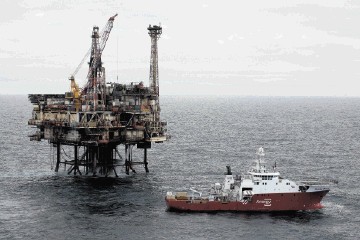
Official figures show that North Sea tax receipts are predicted to fall by 40% over the course of this year.
The Office for Budget Responsibility (OBR) said revenues to the Treasury would drop to £2.8billion by the end of 2014/15, which is 0.9% lower than was forecast at the Budget in May.
The independent body also said that tax to the Exchequer from the North Sea would be £1.6 billion lower in 2015-16 than was predicted in March, with “smaller reductions” due in later years.
Falling oil prices and new capital expenditure were given as the explanation for the latest downgrade.
In its report, the OBR said “changes of this magnitude are not unprecedented”.
It added: “The sharp fall in receipts in 2014-15 reflects the weakness in wholesale gas prices throughout the year and the more recent sharp fall in oil prices. The low level of receipts in 2014-15 also reflects the level of capital expenditure in the industry.
“Spending on several large projects and strong cost pressures mean that capital expenditure in 2014 is around 40 per cent higher than in 2011. With 100 per cent first year allowances available to oil and gas firms, higher investment leads to an immediate reduction in receipts.
Going forward, the report said: “We continue to project weak oil and gas revenues throughout the forecast, with receipts of just £2.7billion or 0.1% of GDP in 2019-20.
“Oil and gas production is expected to be broadly flat over the forecast period, as the current high levels of capital expenditure prevent further falls in production until 2019.
“Compared to March, we expect lower levels of capital and operating expenditure over the forecast period, since lower oil prices will have reduced the net present value of potential capital projects and should reduce upward pressures on operating costs.”
Recommended for you
